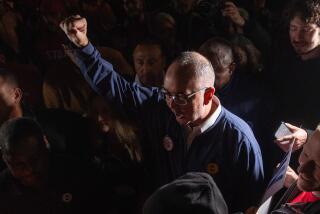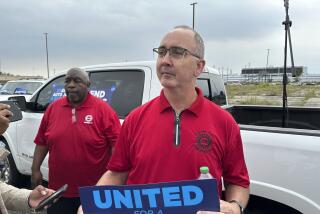Ex-UAW Chief Addresses Trade Panel : Fraser Urges Japanese to Invest More in U.S.
Douglas A. Fraser, president emeritus of the United Auto Workers, on Friday called for more Japanese investment in the United States to help reduce the U.S. trade deficit with Japan and ward off the rising tide of protectionism in Congress.
Addressing a conference on U.S.-Japan economic relations, the American labor leader said more Japanese companies should follow the example set by Nissan and Toyota in establishing U.S. manufacturing plants in order to curb mounting criticism of the U.S.-Japan trade issue.
“I believe relations with Japan are deteriorating,” Fraser told Japanese and American leaders and executives attending the second day of the conference, sponsored by the Los Angeles Times and the Yomiuri Shimbun, a large Japanese newspaper, “The frustration as expressed by Congress is prevalent in this land.”
More than 300 protectionist trade measures, aimed primarily at Japan and other Asian nations, are now being considered by Congress.
Legislative actions to curb imports have been triggered, in part, by the projection that the U.S. trade deficit with Japan alone will reach $50 billion this year.
Rep. Ralph Regula (R-Ohio) said the bills are aimed primarily at creating “fairness” so that Japanese imports are subjected to some of the same costly inspection standards that Japan places on U.S. exports. “Why not have the same standards in both countries? Fair is fair,” Regula said.
The congressman, who represents a north-central Ohio district with both manufacturing and farming interests, cautioned the audience that the sentiment in Washington reflects the predominant view in areas hardest hit by import competition.
“It’s easier to have sympathy (for Japan’s position) in California, which is a funnel for all the imports,” he said.
Friday’s session was peppered with references to World World II, as a number of panelists referred to the end of the conflict as the beginning of the current trade differences.
“In the shop,” said Regula, whose district has 9% to 10% unemployment, “people remind me this all started in 1941.”
Results of a poll released earlier this week showed that feelings of hostility about Pearl Harbor are highest in the Midwest and South and lowest in the West. The poll was conducted simultaneously by The Times in the United States and Yomiuri in Japan.
Amid all the trade-war finger-pointing, most panelists agreed that both the United States and Japan must do more to help each other. Many attempted to share their insights on how American business can succeed or least begin to crack the Japanese market.
James P. Miscoll, executive vice president at Bank of America who has worked in Japan, said American businessmen can avoid “the classic cultural face-off with the Japanese” by learning their language and participating in daily Japanese life, placing their children in Japanese schools and socializing with the local people.
“We are not attempting to become Japanese bankers. But we have to build an aura of respect. . . . You do that by studying the culture of your guest country,” explained Miscoll.
More to Read
Sign up for Essential California
The most important California stories and recommendations in your inbox every morning.
You may occasionally receive promotional content from the Los Angeles Times.










